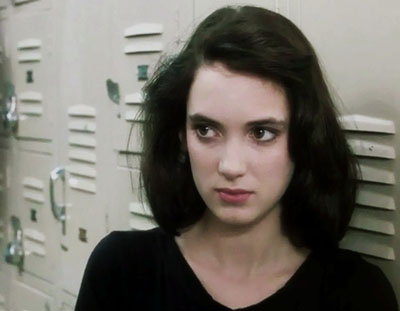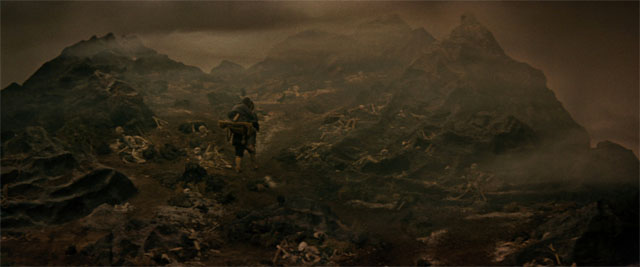“Because Transit wants to pay tribute to the vast universe of the teen movie—a genre that has not enjoyed the critical uptake it deserves—we have decided to embark upon a ‘Teen Moments’ special. It gathers together twenty texts that will be published collectively, in two blocks, over the coming week.”
And Transit has begun with Adrian Martin, whose fascination with the genre has “been going on for almost thirty years now.” Here, he comes at it from a handful of different angles before finally arguing that “there’s something extremely sweet and whimsical, touching and tender, about so many films in this genre—some feeling for everyday life, on its smallest and most mundane scale—a feeling that you don’t much get in most forms of cinema, and that you don’t read about much in much film theory and criticism. In fact, the teen movie seemed then [in the 80’s] (and still seems now) to be the least doctrinaire, the least self-conscious, and the least (as we would later say) politically correct of popular genres.”
It’s an easy segue into Masha Tupitsyn‘s piece for the new issue of the White Review: “I was a pre-teen when Winona Ryder and Johnny Depp moved into a loft across the street from me in Tribeca… Some actors are only made to play certain parts, revealing something about an age through their own age. Personal chronology becomes cultural chronology, and vice versa. Like John Cusack, another black haired/pale skinned 80s/90s idol, as well as a youth actor whose great, and perhaps only gift, was to enact a different kind of youth (a counter-youth and counter-masculinity) in his youth, Winona Ryder was never timeless, she was of the time.”
“I am hoping that someone right now is conducting a quantitative study of dance movies per annum in relation to world economic crisis; until such empirical work is complete, qualitative analysis will have to suffice.” In a piece for Moving Image Source, Joshua Clover considers Steven Soderbergh’s Magic Mike, Scott Speer’s Step Up Revolution, and the Occupy movement.
“[W]hat do we lose of cinema’s documentary value—despite the extensive presence of actual locations—with the use of fast cutting?” asks Girish Shambu. He argues that rapid editing “thins out the profilmic reality” of its location. “Shots are never allowed to build up a ‘documentary strength,’ to fill up with time, to thicken.”
Bomb has begun publishing a series of podcasts and transcripts of interviews and Q&A’s from last month’s First Look series at the Museum of the Moving Image in New York. In the first, Dennis Lim talks with James Benning about his Easy Rider.
“The Zone is the first feature-length film by Vicki Bennett a.k.a People Like Us. Running Stalker and The Wizard of Oz side-by-side, it tells one story of two journeys to ‘the promised land, the world where dreams can be made real and reality is like a dream.’ … The film was only screened once before being silenced by a legal claim by Mosfilm, the owners of the Tarkovsky film Stalker.” The Zone was supposed to have screened at this year’s transmediale in Berlin, but all that was left for Bennett to do was issue a statement: “We can just invite you to imagine an imaginary film museum.”
“The gay rights movement has made exponential strides in the past 20 years, but one has to wonder if Hollywood has been paying attention,” writes Eric Sasson for the New Republic. “Sure, gay characters abound on television, from Modern Family to Glee to The New Normal, but beyond the split-second lip lock, audiences are rarely being exposed to man-on-man action…. By largely ignoring gay male sexuality onscreen, Hollywood seems to be reinforcing the shame associated with gay sex. This is doubly disappointing given that Hollywood is home to some of the gay community’s strongest allies, celebrities who spoke out against Prop 8 in California, hold countless AIDS fundraisers, and participate in ‘It Gets Better’ videos. If anything, things may be getting worse.”
Festival news. Jane Campion will be heading up the Cinéfondation and Short Film Jury of the 66th Cannes Film Festival (May 15 through 26).
Though the Berlinale doesn’t open until Thursday, many of us who live in the city have taken the opportunity to preview films slated for the Forum, Panorama, Generation, and Perspektive Deutschland sections. And then rate them. Critic.de and Perlentaucher have set up an interactive table, Berlinale.cc, where you can measure our first impressions of the films we’ve caught so far.
DVD/Blu-ray. Criterion’s posted Philip Kemp‘s essay on Keisuke Kinoshita, “a hard director to pigeonhole,” and the “uncompromisingly experimental film” The Ballad of Narayama (1958), “an affecting meditation on age and mortality lent the dignity of a ritual by the elegant artifice of its staging and presentation.”
New York. Writing for Artforum, Courtney Fiske notes that tonight’s event at Light Industry “couples [Dan] Graham’s 1983 video, Minor Threat, a looped recording of a November 1982 concert by the titular punk outfit at the Bowery’s CBGB, with Peter Adair’s 1967 film Holy Ghost People, a straight-faced accounting of an evening service at a Holiness church in Scrabble Creek, West Virginia. Apposing the stylized slamming of young punks with the enraptured convulsions of Pentecostals seeking out the Holy Ghost, the pairing humors Graham’s alignment of rock and revivalism to provocative effect.”
The Film Society of Lincoln Center and Unifrance Films have announced the lineup for the 18th Rendez-vous with French Cinema festival, running from February 28 through March 10.
In the works. Lucy Alibar, writer of the Oscar-nominated screenplay for Beasts of the Southern Wild, has adapted Frances Hodgson Burnett’s classic The Secret Garden and Guillermo del Toro will produce. Deadline‘s Mike Fleming Jr.: “There was a swirl of interest in the hope that del Toro could direct, but he’s so busy with his other projects—he opens the big global tent pole Pacific Rim this summer and is working on a sequel; he’s turning Pan’s Labyrinth into a stage musical; he next helms the haunted house pic Crimson Peak; and he’ll direct the pilot for an FX series adaptation of The Strain, the apocalyptic vampire novel he wrote with Chuck Hogan—that del Toro will guide Alibar creatively as producer.”
Lone Scherfig will direct Laura Wade’s adaptation of her own acclaimed and controversial West End play, Posh, reports Andreas Wiseman for Screen. Oliver Lyttelton has more at the Playlist.
Awards. “Skyfall triumphed at the Evening Standard film awards on Monday night, taking both the film of the year and blockbuster of the year prizes ahead of this weekend’s Baftas,” reports the Guardian‘s Ben Child. “Elsewhere, the acting prizes went to Toby Jones for his turn as a sound engineer in the period horror homage Berberian Sound Studio and Andrea Riseborough for her performance as a reluctant IRA informer in the thriller Shadow Dancer. The Peter Sellers prize for comedy went to Ben Wheatley’s Sightseers, the tale of two murderous caravanners, while Bart Layton’s film The Imposter, the real-life tale of a French conman who claimed to be a missing American boy, was named best documentary.”
For news and tips throughout the day every day, follow @KeyframeDaily on Twitter and/or the RSS feed. Get Keyframe Daily in your inbox by signing in at fandor.com/daily.






